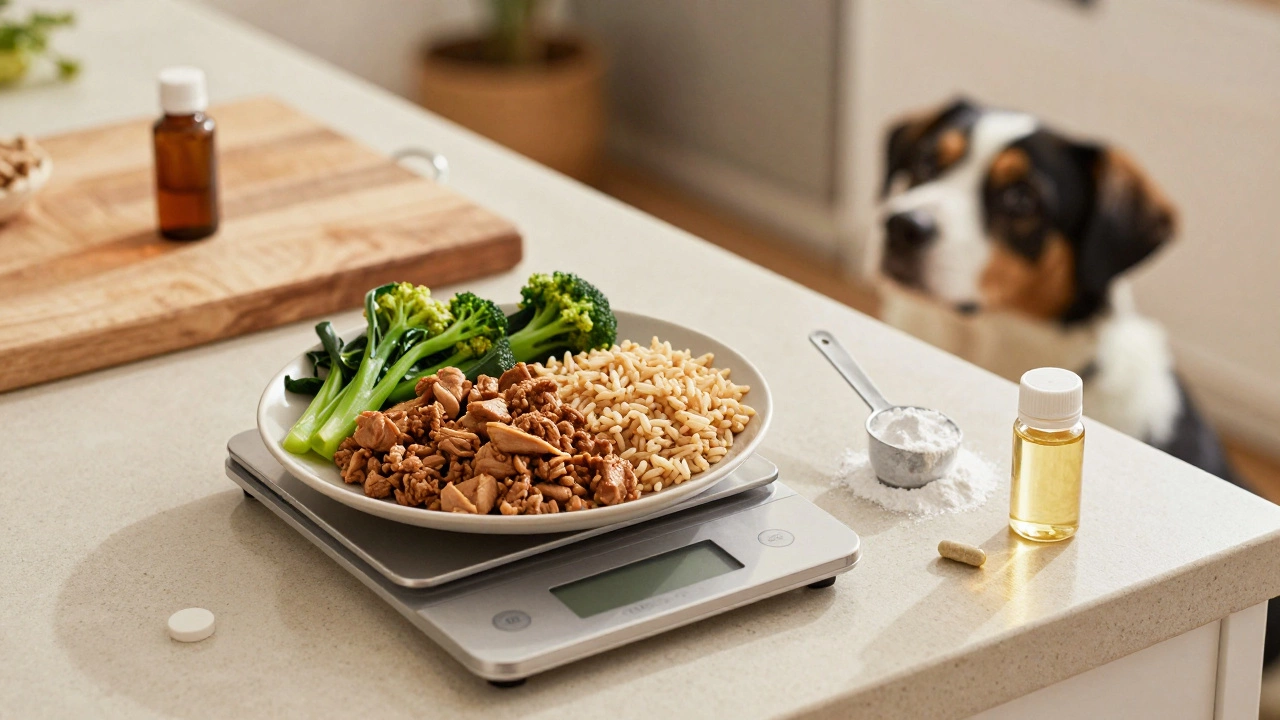When it comes to the health of our beloved four-legged companions, nutrition is a cornerstone that cannot be overlooked. As pet owners, ensuring that our dogs receive the right vitamins is essential for their health and longevity. This article seeks to unravel the importance of vitamins in your dog's diet, shedding light on the specifics of what they need and why they need it.
Vitamins, the silent warriors in dog nutrition, perform a myriad of functions. They are pivotal in boosting immunity, supporting digestion, and maintaining overall vitality. With a variety of vitamins critical to their health, knowing which ones to prioritize can be as challenging as keeping track of all that energy they so exuberantly display. Yet, equipped with the right information, it becomes a manageable task.
- Understanding Dog Nutrition
- The Role of Vitamins in Dogs
- Key Vitamins for Canine Health
- Tips for Vitamin Supplementation
- Signs of Vitamin Deficiencies
Understanding Dog Nutrition
Our canine friends rely on us to make informed decisions about their nutrition. This essential aspect of pet care affects everything from their energy levels to their longevity. One might think setting out a bowl of kibble would suffice, but in reality, a dog's dietary needs are much more nuanced. A well-rounded diet is the first step to ensure that they develop correctly and maintain robust health. It's crucial to remember that dogs are omnivores, and their food should reflect a balance of both animal and plant-based ingredients. Proteins, carbohydrates, fats, vitamins, and minerals all play unique roles in their diet.
The role of proteins is often highlighted because they are vital for muscle growth and repair. Good sources include lean meats, eggs, and fish, which are all packed with the necessary nutrients to keep dogs energized. Carbohydrates, like rice and potatoes, provide the fuel needed for everyday activities, while fats, often found in fish oils, help with brain development and keeping their coats shiny and healthy. Together, these macronutrients lay the groundwork for a diet that supports every dog's adventure and mischief.
The Vital Role of Vitamins
When it comes to vitamins, they might not be the star players, but they are definitely the indispensable backstage crew. These micronutrients facilitate various life-sustaining processes. Vitamins like A, C, D, E, K, and the B complex need to be present in the right amounts to ensure optimal health. Vitamin A, for example, is essential for vision and immune function. A deficiency can lead to night blindness and a weakened immune system. It's mostly found in liver, fish oils, and vegetables such as carrots. Vitamin D, on the other hand, is pivotal for bone health, preventing conditions like rickets, especially in rapidly growing puppies.
"Good nutrition creates health in all areas of our existence. All parts are interconnected.” - T. Colin Campbell
But how can one ensure their pooch is getting enough of these vital nutrients? The answer often lies in a combination of well-formulated dog food and carefully selected supplements. Specially developed dog food often has the right balance of vitamins needed for maintenance, but some dogs, depending on age, activity level, or health condition, may need additional supplements. This is where understanding specific needs becomes paramount. Always consult a vet before adding any supplements to your pet's diet to ensure you provide what’s truly necessary.
The Importance of Balanced Canine Diet
Balance is key in canine nutrition. According to data from various studies, nearly 25% of health problems in dogs are linked to improper diet. Dog vitamins cannot be overlooked in the quest for balanced nutrition. When planning your dog’s diet, ensure it covers all bases — from protein and fats to the often-overlooked vitamins and minerals. Being proactive and informed can help prevent numerous health issues down the line, ensuring your pet leads a happy, healthy life.
The Role of Vitamins in Dogs
When considering the nutritional needs of our dogs, vitamins emerge as the unsung heroes, performing remarkably intricate tasks it would take us lifetimes to fully appreciate. Much like the roadway signs guiding our vehicles to destinations unknown, these essential nutrients operate quietly, yet vitally, within your pet’s body. Vitamins facilitate countless biochemical functions necessary for maintaining a state of optimal health in dogs. From supporting a strong immune response to assisting in bone growth and maintenance, these micronutrients play an indispensable role.
The significance of vitamins transcends mere survival; they actively contribute to the vitality and longevity of your dog. Vitamin A, for instance, is crucial for maintaining good vision and supporting neurological development. Without an adequate amount of Vitamin A, your dog might experience vision problems, among other health concerns. Then there’s Vitamin D, often referred to as the 'sunshine vitamin', essential for its role in allowing your dog’s body to properly regulate the balance and retention of calcium and phosphorus, thereby encouraging strong, healthy bones. Surprisingly, much like humans, dogs also synthesize Vitamin D when exposed to sunlight, although their primary source of dietary vitamin D comes from their food.
Consider too, the powerhouse Vitamin E, a potent antioxidant that helps your dog fend off the damage from free radicals, keeping his cells healthy and aiding his immune function. Meanwhile, B vitamins, which encompass thiamine, riboflavin, niacin, and more, are vital for energy production, red blood cell formation, and a variety of metabolic processes. All contribute uniquely to your pet’s health and are often found in their kibble or dietary supplements.
Renowned veterinarian Dr. Kate Knutson once mentioned, "Getting the right nutrients is critical. Just like us, dogs need a well-rounded diet that supports all aspects of health — from brain function to coat quality."
Labeling the role of vitamins as 'supportive', while true, slightly understates their importance. For instance, Vitamin C, although not required in dog diets due to their ability to make their own, can be introduced as a supplement, providing anti-oxidative benefits that assist the developing pups or aging dogs. Despite conflicting ideologies on supplementation, there's a growing consensus that it can augment their natural diets, especially when high-quality, natural sources are inaccessible.
In summary, understanding and providing the right mix of vitamins is one of the most generous gestures of love a pet owner can afford their furry companion. Although dogs have different nutritional requirements than humans, the core principle remains the same: providing a balanced, vitamin-rich diet ensures not only survival but a thriving, loving companion beside us.

Key Vitamins for Canine Health
Diet is at the heart of keeping a dog's nutrition balanced, and vitamins remain a fundamental piece of that puzzle. For our canine companions, there are a handful of vital vitamins that ensure their bodily functions run smoothly, each offering unique benefits. Let's start with Vitamin A, which plays a crucial role in preserving eye health, supporting immune system function, and keeping skin and coat looking radiant. Much like in humans, Vitamin A is indispensable for vision, especially for healthy retinas. It's found naturally in liver, fish oils, and some plant-based foods. Now, your dog might not have the same tastes as you’d imagine, but ensuring they get enough of this vitamin is essential for their night vision and overall eye health.
Vitamin D is another superstar, often referred to as the "sunshine vitamin." This vitamin is incredibly important for efficient calcium metabolism—helping to sustain bone strength and growth, which is key for dogs in developmental stages or those experiencing any bone-related issues. Without enough Vitamin D, dogs can suffer from skeletal disorders. And because they rely on dietary sources to obtain it, the inclusion of liver, fatty fish, and egg yolks can help meet their needs. Vitamin D assists your canine in maintaining a sturdy skeletal structure, a fact that cannot be stressed enough for breeds predisposed to bone problems.
Next on the docket is Vitamin E, nature's very own antioxidant which acts as a shield, safeguarding against oxidative damage—a common concern affecting cellular health. It's not only great for the skin and coat, but it also helps maintain a healthy reproductive system and circulatory functions. This vitamin is vital for keeping everything from their skin to their immune system in tip-top shape. A deficiency in Vitamin E can lead to problems like muscle weakness or reproductive failure, quite serious issues if not addressed with a balanced diet.
Another crucial addition to the dog vitamins mix is Vitamin K, integral for the coagulation of blood. It’s a lifesaver, quite literally, ensuring that should they suffer any nicks or cuts, their blood clots as it should, preventing excessive bleeding. Deficiencies are rare but can occur, particularly if their diet doesn’t include enough liver or leafy greens, major sources of this vitamin. It's certainly reassuring to know that a dash of this can prevent bigger problems down the line, be it minor scrapes or more significant wounds.
A final spotlight goes to the B Complex vitamins, comprising several essential nutrients that address various needs, from energy production to maintaining a steady nervous system. B vitamins such as B1 (Thiamine) help in transforming carbohydrates into energy, while B6 plays a pivotal role in amino acid metabolism. Making sure your dog’s diet includes foods rich in B vitamins, like pork, fish, and whole grains, is therefore tremendously important. It's fascinating how these varied vitamins come together to form a symphony of health, each playing a part in your dog's harmonious living.
"Nutrition is an essential component of preventive care in dogs. Sufficient vitamin intake can mitigate risks related to various diseases," says Dr. Emily Swiniarski, DVM. This quote highlights the importance of understanding exactly which vitamins matter for canine health and ensuring they are not sidelined in the nutritional equation.
To ensure your dog's diet hits the mark on these essential vitamins, you might consider consulting a veterinarian for personalized advice. They can offer insights into specific health conditions, breed-specific needs, and dietary restrictions, all contributing to your dog's health and happiness.
Tips for Vitamin Supplementation
When it comes to ensuring that your dog receives adequate vitamins, it's vital to approach supplementation with mindful consideration. Not all health challenges in dogs are apparent at first glance, which is why understanding the nuances of vitamin balance is crucial. Begin by consulting with your veterinarian to evaluate your dog's current health needs. This will help determine if your furry friend requires additional dog vitamins beyond their regular diet. Regular check-ups can provide insights into any gaps that might be present in their nutrition, shedding light on the necessity and type of supplements required.
One crucial tip is to prioritize a balanced diet above supplementation. High-quality dog food often contains the necessary dog nutrition essentials, including a range of vitamins. Ensure that these foods are suited to both the age and breed of your dog as their vitamin needs might change over time. Choosing the right diet, whether it's retail packaged or home-cooked, is an excellent starting point for natural vitamin intake. If you opt for homemade meals, it's advisable to work closely with a pet nutritionist to formulate a well-rounded diet.
Before introducing any canine supplements, try keeping a dietary journal for a few weeks to track what your dog eats daily. This practice can help identify inadvertent vitamin deficiencies. If you find gaps, consider fortified treats or snacks designed with specific vitamins. Be wary, though, not to mix too many different supplements. Often it's more beneficial to target specific vitamins that are lacking rather than offering a variety of supplements without precise reasoning.
An important thing to remember is that natural sources of vitamins, such as fresh vegetables, fruits, and meats, can often be more beneficial than artificial supplements. Elements like carrots, spinach, and blueberries can boast a significant number of beneficial vitamins for dogs. Yet, always be cautious; some human foods are toxic to dogs. Educate yourself and ensure you're introducing safe options. Pet health experts suggest starting with small servings and observing your dog's reaction before making any ingredient a regular part of their diet.
"Supplementation should be a carefully considered decision, often not a necessity when a balanced diet is in place," advises Dr. Julia Steinkamp, a notable veterinary nutritionist. "Yet, for some pets with specific needs, supplements could play a pivotal role in promoting optimum health."
If you decide that supplements are necessary, choose ones that adhere to high manufacturing standards. Look for brands that have been tested and certified by independent laboratories to guarantee quality and potency. Avoid products filled with unnecessary additives or preservatives. Reading reviews from other dog owners can provide additional insights into product effectiveness. Pet health forums can be a valuable resource in gathering experiences from the broader community.

Signs of Vitamin Deficiencies
Remaining observant of your dog’s health involves more than just providing their daily needs. Spotting vitamin deficiencies can be crucial in preventing potential health issues. These deficiencies manifest in various ways, and being able to recognize them early can make all the difference. A lack of essential vitamins in your dog's diet may not immediately exhibit obvious symptoms, which is why a vigilant eye is necessary.
For instance, Vitamin A is vital for your furry friend's vision and skin health. If your dog experiences night blindness, dry skin, or a rough coat, these could be alarm bells signaling a deficiency. Vitamin A also supports immune health, and a compromised immune system could lead to frequent infections. Another critical vitamin, Vitamin D, aids in the regulation of calcium and phosphorus in the body. Signs of deficiency might be brittle bones or muscle weakness, significantly impacting your pet's mobility and general wellbeing.
Vitamin E is another standout player, contributing to the protection of cells from oxidative damage. Symptoms of a deficiency aren’t as immediately noticeable but can include neurological problems and weakened muscles. Observing coordination issues or unexpected lethargy in your dog might prompt an evaluation of their Vitamin E intake. B vitamins, a complex group that includes B1, B6, and B12, are essential for energy production and neural function. Dogs with a deficiency may display fatigue, poor growth, or even cognitive decline.
"A well-nourished pet is often a happy pet. Recognizing vitamin deficiencies early can prevent numerous health complications," says Dr. Jane Doe, a renowned veterinarian and canine nutrition expert.
Being proactive about these signs is essential. Regular veterinary check-ups ensure your dog’s diet meets their nutritional needs, reducing the risk of deficiencies. Providing a balanced diet with the help of dog vitamins and supplements can offer peace of mind that your pet is getting the nutrients they need. Supplements tailored to your dog's specific needs, whether age, breed, or health condition, can be an effective way to bridge any nutritional gaps.
How to Address Deficiencies
If you suspect that your dog may be experiencing a nutrient deficiency, consult with a veterinarian immediately. They can perform blood work or other diagnostic tests to confirm any suspicions. Treatment typically involves dietary adjustments or supplements; the vet may recommend specific pet health products designed to replenish these vital nutrients. Supplements should always be administered under professional advice, as excessive intake of certain vitamins can lead to toxicity and adverse effects.
Your role as a pet owner is integral to your dog's health; the time invested in understanding nutritional needs and monitoring your companion for signs of deficiency promotes a lifelong positive impact. Beyond individual symptoms, the overall demeanor and energy level of your dog can often be the first indicators of underlying health issues. Stay informed and attentive, as your diligent care naturally reflects in your pet's happiness and vitality.









